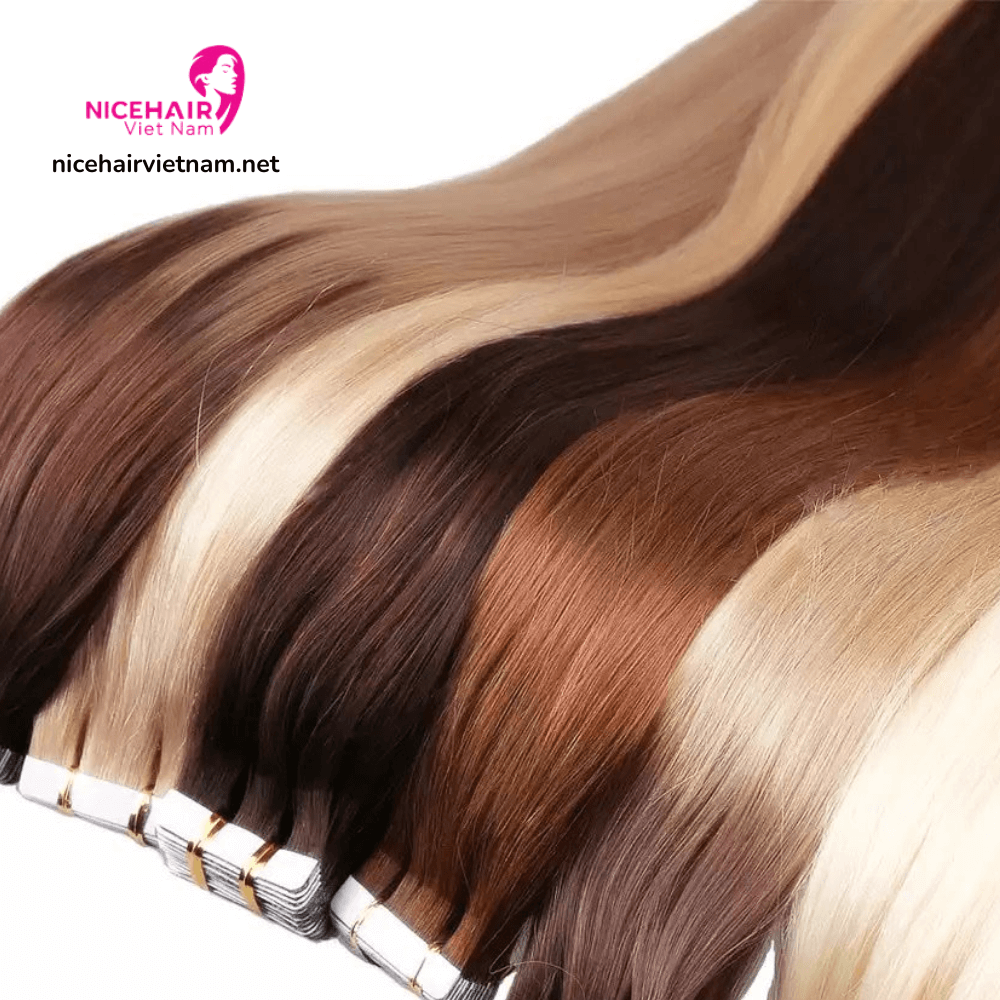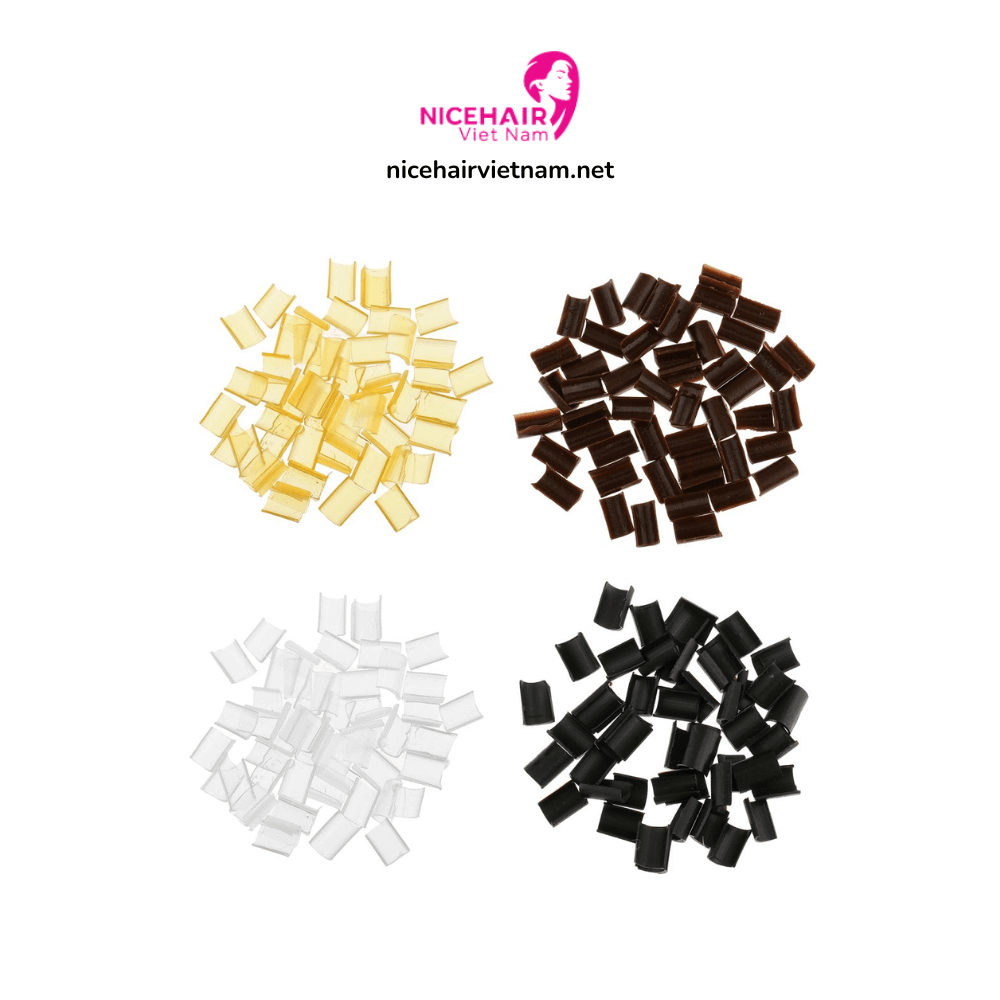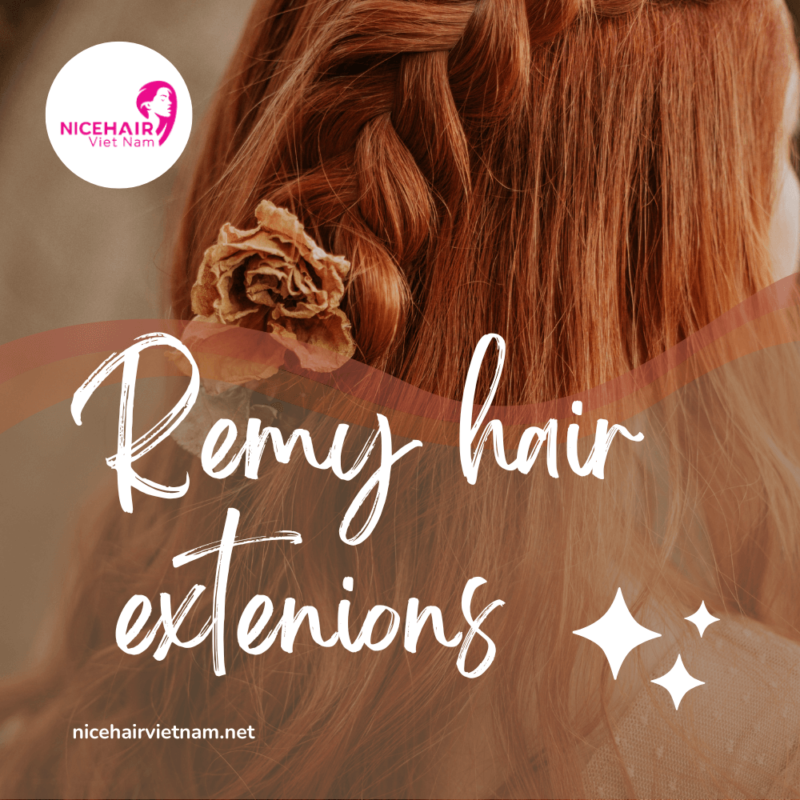If you are looking for a way to enhance your hair look without committing to permanent processes which will help preserve your natural hair strength in most cases, then, using hair extensions should be considered as a great idea that promisingly satisfies all of the above demand. However, you might be confused when choosing which type of hair extensions suits you best since nowadays, there is a vast majority of hair extensions being sold both on the online and offline markets. And by helping you have a deeper understanding of each type of hair extensions, we hope that you can narrow down your options and confuse as well. In this post, information about remy hair extensions– which hair extensions are distinguished based on the origin of the hair strands as main material of hair extensions. Are you interested in remy hair extensions? Let’s start the exciting journey and you may find your own answer to this question!
Overview of remy hair extensions
Remy hair extensions are a commonly used term within the hair extension industry. Known for their exceptional quality and affordability, these extensions have gained significant popularity among professionals in the hairdressing field. Now let’s first get to know the basic definition of it.
Definition
In essence, remy hair extensions are obtained by meticulously collecting human hair in a manner that preserves the alignment of the cuticles and strands, ensuring they all flow in the same direction. This meticulous gathering process involves obtaining the hair directly from the root. Subsequently, the gathered hair undergoes minimal treatment before being utilized for the production of human hair extensions. As a result, remy hair extensions boast a remarkable aesthetic appeal and an incredibly natural look, making them widely recognized as one of the finest and most sought-after options available in the market.
Classification of remy hair extensions methods
Remy hair extensions are a popular choice among women as they provide the opportunity to transform their appearance within a few hours. With numerous hair extension methods available, it is important to carefully consider your options before making a decision. Each remy hair extension method comes with its own set of advantages and disadvantages, so it is essential to weigh them carefully to choose the one that best suits your needs.
Tape-in method

Tape-in remy hair extension provides a straightforward and time-efficient process for hair extensions, typically completed within a few hours. These extensions are available in various lengths, ranging from 3.8 cm to 20 cm, with each extension equipped with either 2-sided or 1-sided polyurethane tape to match its size. When properly applied, these tape-in extensions can last between 4 to 6 weeks.
It’s also important to note that the adhesive used for the tape-in method requires a minimum of 24 hours to securely set. During this time, it is advised to avoid activities that may cause sweating or washing the hair. Additionally, it is recommended to steer clear of silicone-based or conditioner-containing products, as they can compromise the adhesive and result in the extensions coming loose. It’s crucial to ensure that the hair is not tied too tightly while using this extension method to maintain comfort.
Clip-in method

Clip-in remy hair extensions are a convenient and versatile method of hair extension. These extensions come with clips at the top, allowing you to effortlessly achieve longer and thicker hair within minutes. By simply attaching them at the hairline, you can quickly transform your look. This type of clip-in hair extensions are available in various sizes, ranging from 2 to 8 inches, offering flexibility in choosing the desired length.
Clip-in hair extensions made with remy hair are an ideal choice for those seeking a quick solution for longer hair. They can be easily attached by clipping them at the hairline, taking only around 5 to 10 minutes to complete the process. Once attached, you can style and arrange the curls to blend seamlessly with your natural hair. The convenience of remy hair extension clip-in lies in their easy application and removal, allowing you to clip them on and off whenever desired, providing maximum flexibility and versatility for your hairstyle.
Heat method

The heat method for applying remy hair extensions is a highly sophisticated process that should only be carried out by professional hairdressers. It involves the use of a silicone-lined U-shaped keratin chips to attach the hair extension. The extension is securely bonded to your natural hairline using a heating instrument. The silicone liner serves as a protective barrier, shielding your hair from heat damage. The implementation of this method typically takes 6 to 8 hours, and with proper care, the extensions can last for a follow-up period of 4 to 6 months. The beauty of this technique lies in the fact that the dry keratin bonds remain virtually invisible, seamlessly blending with your natural hair.
It’s important to note that heat can potentially cause damage to your hair, which is why it is crucial to entrust this procedure to qualified specialists who possess the necessary expertise. An incorrect application of the heat method can lead to severe damage to the hair, underscoring the importance of seeking professional assistance for the best results and the preservation of hair health.
Compare virgin vs remy hair extensions
Within the hair extension realm, two types are commonly found: virgin hair extensions and remy hair extensions. However, it is unfortunate that only a limited number of hair extension vendors provide adequate information to help consumers distinguish between these two concepts.
Virgin hair extensions
Virgin hair extensions are sourced from a single donor and are completely chemical-free. These extensions retain their original cuticles and maintain consistent hair alignment. For instance, if the hair used for the extensions is straight and black, it will remain as such. Consequently, if you encounter naturally curly hair in virgin extensions, you can easily straighten it and use it accordingly. Untreated natural hair retains its softness and silkiness, providing a pleasant tactile experience, and it allows for seamless extension of the hair if desired.
Pros
- Unlike remy hair extensions, virgin hair extensions offer the flexibility to be colored just like your natural hair. You can use hair dryers, blow-dryers, and hair care products to apply color, bleach, or create waves without any issues.
- One significant advantage of virgin hair extensions is their extended lifespan compared to treated hair. With proper care, these extensions can last for several years. Additionally, since they are typically free from silicone, the hair becomes softer and easier to manage after washing.
- Moreover, virgin or untreated hair exhibits greater heat resistance than treated hair. This means you can confidently wear your wavy hairstyle even in challenging weather conditions such as strong winds, high humidity, or inclement weather without worrying about damaging the hair extensions.
Cons
- Virgin hair extensions, although they may come with a higher price tag and require more effort to source, offer a diverse range of hairstyles to choose from. The key benefit of virgin hair is that it remains in its unaltered state since it has not undergone any chemical treatments. This means that when you separate the hair from its original source, it retains its natural characteristics.
- For example, if your virgin hair extensions are naturally straight and you wish to achieve a curly hairstyle, you would need to use styling techniques such as curling or employing Jerry curl methods to transform the hair into the desired curly texture. The advantage of virgin hair extensions is that they possess the versatility to be styled according to your preference, allowing you to explore various hairstyles that align with your desired look.
Remy hair extensions
Remy hair extensions, or treated hair, are created using a production process that involves chemical treatment. The hair undergoes treatment and acid baths to remove the cuticle and alter its natural characteristics. However, it’s important to note that this does not mean remy hair extensions lack benefits.
The chemical treatment involved in the production of remy hair extensions actually offers advantages. It allows for various hair coloring and bleaching techniques, resulting in a wide range of hairstyles and stunning hues. These modern hair color wavy hairstyles achieved with remy hair extensions undoubtedly surpass the outcomes one can achieve at home using natural, untreated hair extensions.
Pros
- Remy hair extensions undergo a process where the cuticles are removed, enabling them to be completely dyed and styled as desired by the manufacturer.
- Additionally, the presence of silicone in treated hair extensions enhances their shine.
- One notable advantage of remy hair extensions is their affordability compared to untreated natural hair. They are readily accessible in the market, offering a cost-effective option for those seeking high-quality extensions.
Cons
Compared to virgin hair extensions, remy hair does not have the same longevity and durability. While remy hair extensions are still of high quality, they tend to have a shorter lifespan compared to virgin hair extensions.
Who buys remy hair extensions?
When it comes to the buyers of remy hair extensions, they are typically categorized into three main groups based on their intended use: retailers, hair salons, and individual users. Each group has distinct purchasing sources, although in general, hair extensions are sourced from wholesalers.
Retailers
Retailers play a pivotal role as a promising customer segment for wholesalers of remy hair extensions. These retailers can include agencies or shops that are interested in purchasing large quantities of remy hair extensions. Building strong and long-term commercial relationships with distributors becomes more likely when the product offered is of high quality and reasonably priced.
The target clients of retailers encompass both hair salons and individual customers seeking hair extensions for personal use. The products offered to these two customer groups differ significantly as well. Hair salons, due to the nature of their profession, tend to purchase a larger volume of merchandise compared to individual customers. Remy hair extensions obtained from retailers are often pre-processed, transformed into items such as hair clips, wigs, and more. The price of unprocessed hair extensions tends to be lower, but the preparation steps required are time-consuming and meticulous, making it challenging for beginners to achieve the desired results in terms of both aesthetics and efficiency.
Hair salon
Large hair salons often import hair extensions directly from wholesalers or hair stores, each option having its own advantages and disadvantages. Hair stores are easily accessible, offering convenience in securing a steady supply of hair extension products, and remy hair extensions from wholesalers tend to be more cost-effective.
Hair salons purchase remy hair extensions for two main purposes: to apply directly to customers’ hair and to create wigs. These salons are equipped with experienced stylists who stay updated with the latest hair extension techniques. They provide a wide range of options in terms of extension lengths, styles, and colors for customers to choose from. Additionally, if desired, professional hair stylists can easily customize the hair extensions to meet specific preferences and requirements.
End user
The majority of customers do not typically purchase remy hair extensions in bulk directly from suppliers. Instead, they choose to acquire hair extensions from hair salons or utilize the hair extension services offered by these salons. Hair salons often create remy hair extensions using various attachment methods such as elastics, silk, fiberglass, keratin, and more. These methods are preferred by consumers due to their long-lasting nature and the ability to achieve a realistic look that closely resembles natural hair.
While some individuals with the necessary skills and experience may opt to obtain remy hair extensions from a hair salon and apply them themselves, it is generally advised to seek professional assistance. This is because incorrect application can potentially cause damage to natural hair, making the involvement of specialists highly recommended.
In addition to traditional methods involving the use of hair clips, tape, or wigs, there is a growing popularity of easy-to-use at-home procedures among hair extension users. These remy hair extensions are designed as beauty accessories for everyday use, offering individuals the opportunity to enhance their hairstyles conveniently.

